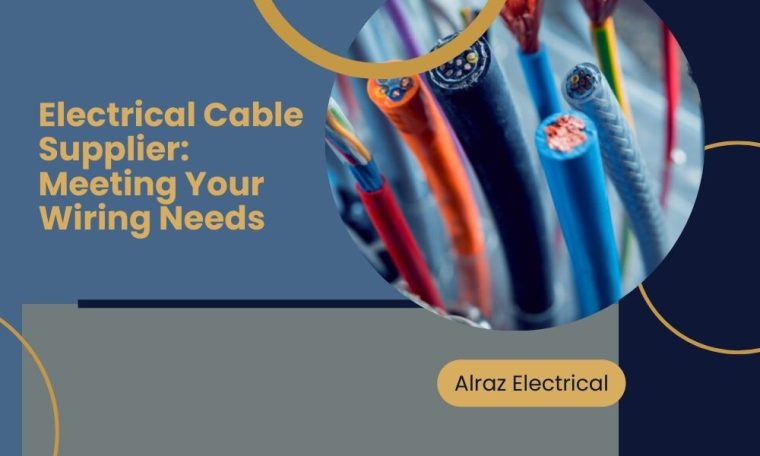
When it comes to powering our homes, offices, and industries, we often take electrical cables for granted. These unassuming strands of wires play a crucial role in ensuring a steady flow of electricity, enabling our devices to function seamlessly. In this blog, we will delve into the world of electrical cables and discuss how choosing the right electrical cable supplier can make a significant difference in ensuring the safety and efficiency of your electrical systems.
Understanding Electrical Cables
Electrical cables are conductive materials that transmit electricity, comprising a conductor (usually copper or aluminium), insulation to prevent unintended electricity flow, and a protective sheath. Various types, such as power, control, communication, and coaxial cables, cater to specific applications in transmitting power, signals, or data.
Before we dive into the importance of selecting the right electrical cable supplier, let’s start by understanding what electrical cables are and how they work.
What Are Electrical Cables?
Electrical cables, often referred to simply as “wires,” are conductive materials that transmit electrical power from one point to another. They are composed of several components, including:
- Conductor: The inner core of the cable, usually made of copper or aluminum, conducts electricity.
- Insulation: A layer of non-conductive material (like PVC) that surrounds the conductor, preventing the flow of electricity to unintended places.
- Sheath: The cable’s outermost layer protects it from physical damage and environmental factors.
Types of Electrical Cables
Electrical cables come in various types, each designed for specific applications. The most common types include:
1. Power Cables
Power cables transmit electricity from power sources (e.g., generators, substations) to different parts of a building or facility, and they typically serve high-voltage applications.
2. Control Cables
Control cables are utilized to transmit signals for controlling electrical equipment. They are often found in automation and instrumentation systems.
3. Communication Cables
Communication cables are specifically designed for transmitting data signals. They are commonly used in telephone lines, computer networks, and audiovisual systems.
4. Coaxial Cables
Coaxial cables are known for their excellent signal transmission properties. They are widely used in television, internet, and radio connections.
Now that we have a basic understanding of electrical cables, let’s move on to why choosing the right electrical cable supplier is essential.
Importance of Choosing the Right Electrical Cable Supplier
Selecting the right electrical cable supplier is of paramount importance for both safety and efficiency. Firstly, safety should always be a top priority when it comes to electrical systems. Poor-quality cables or those that don’t meet safety standards can lead to electrical hazards, including fires and electrocution. A reputable electrical cable supplier ensures that their products comply with all safety regulations, offering peace of mind to consumers.
Secondly, the reliability of your electrical systems heavily relies on the quality of the components, especially cables. Imagine the inconvenience and potential losses associated with power interruptions due to cable failures. Reliable electrical cables from a trusted supplier minimize the risk of such disruptions, ensuring that your electrical systems run smoothly. Additionally, high-quality cables have lower resistance, reducing energy loss during transmission and leading to cost savings in the long run. Investing in durable electrical cables extends the lifespan of your electrical systems, reducing the need for frequent replacements. In conclusion, the choice of an electrical cable supplier directly impacts safety, reliability, efficiency, and the overall longevity of your electrical systems.
Selecting a reliable electrical cable supplier is paramount for several reasons:
1. Safety First
Safety should always be a top priority when it comes to electrical systems. Poor-quality cables or those that don’t meet safety standards can lead to electrical hazards, including fires and electrocution. A reputable electrical cable supplier ensures that their products comply with all safety regulations.
2. Reliability Matters
Imagine the inconvenience and potential losses associated with power interruptions due to cable failures. Reliable electrical cables from a trusted supplier minimize the risk of such disruptions, ensuring that your electrical systems run smoothly.
3. Efficiency and Performance
The efficiency of your electrical systems depends on the quality of the components, including cables. High-quality cables have lower resistance, reducing energy loss during transmission and leading to cost savings in the long run.
4. Longevity of Systems
Investing in durable electrical cables extends the lifespan of your electrical systems. Quality cables are less prone to wear and tear, reducing the need for frequent replacements.

How to Choose the Right Electrical Cable Supplier
Now that you understand why it’s crucial to choose the right electrical cable supplier, let’s explore some key factors to consider during your selection process.
1. Quality Assurance
Look for a supplier that provides products certified by relevant industry standards. This ensures that the cables have undergone rigorous testing for safety and performance.
2. Experience and Reputation
Experience matters in the world of electrical cables. A supplier with a long-standing reputation for delivering quality products is likely to be a reliable choice.
3. Product Range
Ensure that the supplier offers a wide range of cables to meet your specific needs. Whether you require power cables, control cables, or communication cables, they should have you covered.
4. Customer Support
Good customer support is essential, especially when you have questions or face issues with your purchase. A supplier that offers responsive customer support can make your experience hassle-free.
5. Competitive Pricing
While quality should be a priority, competitive pricing is also crucial. Compare prices from different suppliers to find a balance between quality and cost-effectiveness.
6. Delivery and Logistics
Consider the supplier’s ability to deliver products on time. Reliable logistics and on-time deliveries can prevent project delays and disruptions.
Conclusion
Choosing the right electrical cable supplier is a decision that should not be taken lightly. The safety, reliability, efficiency, and longevity of your electrical systems depend on the quality of the cables you use. By prioritizing quality, considering the supplier’s reputation, and evaluating various factors like product range and pricing, you can make an informed choice that benefits your electrical installations in the long run.
Remember, electrical cables are the backbone of our modern world’s power distribution. Ensuring they come from a trusted supplier is an investment in the safety and functionality of your electrical systems. So, when you’re in need of electrical cables, make sure to choose wisely, because your peace of mind and the smooth operation of your systems depend on it.



